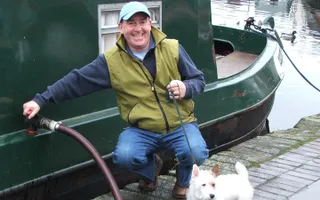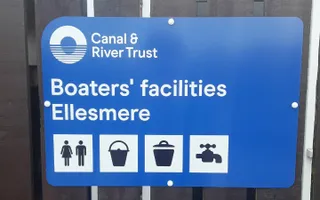Cassette (Elsan) toilets
Cassette toilet users need to dispose of the contents of their cassette using an Elsan sanitary facility. The waste holding tanks or 'cassettes' vary in size but they are generally easily portable, making them a convenient choice for many liveaboard boaters. They are ideal for when a boat is iced in during the winter and unable to cruise.
Read our guidelines for using an Elsan facility.
It's a big job but somebody has to do it
We provide around 220 sanitary facilities across our network, with many more provided by third parties, such as marinas and boat yards. Using them requires more care than using a standard mains-plumbed sewage system.
Sadly our facilities are frequently abused by people throwing inappropriate items into them, from nappies to black bags of domestic waste, used engine oil and more. The result is a blocked, revolting mess that not only poses a pollution threat to the environment but can cost us up to £6,000 a time to sort out.
Pump-out toilets
Boaters who have a holding tank for toilet waste will need to use a pump-out facility to empty the tank. Once again we provide some facilities, as do many marinas and boat yards. There is a charge for using pump-out facilities, which is not included in the boat licence fee.
Many of our facilities don't drain into the main sewage system so it's a constant job for us to service all these septic tanks. What you must never do is use a free-standing pump to pump out your tank into an Elsan disposal point. These simply don't have the capacity and there's a high risk of the waste backing up and overflowing. Pollution of the canalside with raw sewage would be a very serious offence, as well as a health hazard.
Separator toilets
(also know as waterless or composting toilets)
These toilets are increasing in popularity, particularly in areas with few facilities or very busy areas that suffer from frequently malfunctioning pump-out machines or Elsan units. They can be a great solution, but there are some important considerations for people choosing this approach.
The main thing to consider with separator toilets on boats is having sufficient space to compost solids correctly. Solids can take anything from three months to twelve months to break down into harmless compost. And as anyone who has ever lived on a boat for any length of time will tell you, space is always at a premium.
As the waste from a composting toilet may not have enough time to decompose sufficiently on board the boat before it needs emptying, this waste will still need to be disposed of in an appropriate way – for example a suitable composting site away from the canal. It should not be put in our bins – and absolutely must not be disposed of on or near the towpaths. Liquid waste can be emptied down an Elsan point. Please don't ever dump liquid and solid waste on the towpath or into the water.
You'll also need to decide between hot composting or cold composting toilets.
Separator toilet position statement
If you're considering getting a separator/composting toilet for your boat, please only do so if you have the ability to completely compost the solid waste from your toilet yourself or have access to somewhere that will do this for you. If you don't have the ability to do this, then getting a separator/composting toilet is not the best solution for you. Pump-out and elsan facilities are available across our network for boats with tanks or cassette toilets to use instead.
If you currently have a separator/composting toilet on your boat and are not able to completely compost the solid waste from your toilet yourself or have access to somewhere that will do it for you, then the alternative disposal method of bagging and binning it is not an environmentally sustainable way to deal with this waste and is not permitted. Bagged solid waste disposed of in bins can also lead to cross contamination of other content, which otherwise is sorted and mostly recycled, and can result in the whole content of the bin needing to be disposed of in landfill. Sending waste to landfill adds costs as landfill taxes are charged.
If you have a separator/compost toilet on your boat and have been putting bagged and binned waste in our waste bins, you need to find an alternative way to dispose of this waste. We will continue to work with boaters and others to identify a sustainable solution for the disposal of this waste.
March 2021
FAQs
Why has your advice about the disposal of solid waste from separator/composting toilets changed?
We believe that there is a regulatory problem with the approach that we had which meant we had to change our guidance for boaters to disposing of solid waste at an appropriate composting site away from the canal rather than bagged up in our canal-side bins. We appreciate that, in the short term, the advice isn't ideal for those with a separator/composting toilet, but we do need to ensure that our guidance complies with waste disposal regulations.
Is this new guidance in force right now?
Yes, following an initial grace period, this guidance is now in force. Since the end of December 2021, no bagged solid waste from separator/compost toilets is allowed to be disposed of in Canal & River Trust waste bins.
Does this mean used nappies cannot be disposed of in your bins?
No. Used nappies can still be placed along with other household waste just in the same way that land-based parents and carers would.
If I can't dispose of solid waste at a canal-side facility where should I put it?
If you don't have the space to store and let the composting process happen (around 12 months), your waste should be disposed of at a suitable composting site away from the canal. Putting partly-composted waste down an Elsan leads to blockages (as this waste is very dry) which are expensive to fix. Liquid from these toilets can still be disposed of in Elsans.
What if I'm thinking about getting a separator/composting toilet for my boat?
We strongly advise that you only do so if you have the ability to completely compost the solid waste from your toilet yourself or have access to somewhere that will do this for you. If you don't have the ability to do this, then getting a separator/compost toilet is not the best solution for you. Pump-out and elsan facilities are available across our network for boats with tanks or cassette toilets to use instead.
Will this new guidance be in force forever?
The Trust is concerned at the numbers of boaters who voiced issues because they have opted to dispose of their solid waste into bins rather than following the principles of sustainable composting. The bagging and binning of this type of waste is not an environmentally sustainable way of disposal and we strongly advise that boaters only use a separator/composting toilet if they have the ability to completely compost the solid waste from it or have access to somewhere that will do this for them.
We will continue to work with any boaters and others to seek, identify and promote sustainable solutions for the disposal of this waste, including working with third parties who may be able to offer a service for those with separator/composting toilets.
What will be done to find a way to deal with this waste from separator/composting toilets?
We will support boaters and other partners who are keen to find sustainable ways to dispose of this waste. This could include supporting environmentally-friendly and sustainable pilot projects that resolve this issue.
What to do and what not to do
Here are a few simple dos and don'ts for everyone using onboard toilet facilities. To avoid blockages and problems, no matter what type of toilet system you use, you need to remember just a couple of simple rules.
- Don't use a toilet to dispose of anything other than the 'three Ps' (pee, poo and paper).
- Only use a small quantity of toilet paper.
- Only use the smallest amount of chemical recommended, and try to use an environmentally friendly product if you can (in pump-out/cassette toilets).
- Never pour urine into the canal or onto the towpath.
Whatever type of throne you sit on, please use our waste facilities responsibly, not only to keep them clean and available for your fellow boaters, but to protect the environment from harm. Allow us to spend our precious resources on maintaining the canals, rather than on repeatedly unblocking the sanitary facilities.





